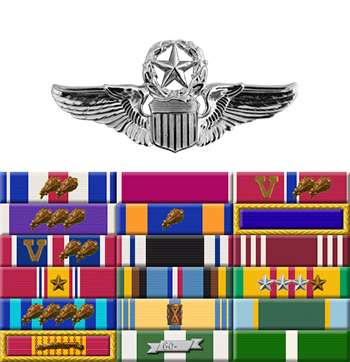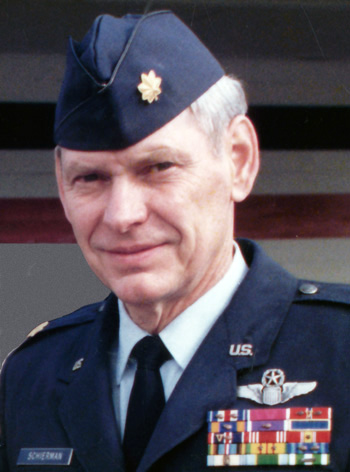
|
Wesley D. Schierman |
 |
|||
| Rank, Service | ||||
Major O-4, U.S. Air Force |
||||
| Veteran of: | ||||
|
||||
| Tribute: | ||||
Wes Schierman was born on July 21, 1935, in St John, Washington. He enlisted in the Washington Air National Guard on February 2, 1953, and entered the Aviation Cadet Program on October 26, 1954. Schierman was commissioned a 2Lt in the Air Force and earned his pilot wings on February 23, 1956, followed by Fighter Gunnery Training in the T-33 and F-86. In June 1956, Wes went into reserve status with the Washington ANG, where he served as an interceptor pilot flying F-94A & B Starfire and F-89D & J Scorpion aircraft. He also flew the T-33 as an instructor pilot before returning to active duty with the Air Force in September 1962. Schierman served with the 481st Tactical Fighter Squadron at Cannon AFB, New Mexico, flying the F-100 Super Sabre, from September 1962 until March 1964, and then flying the F-105 Thunderchief with the 67th Tactical Fighter Squadron at Kadena AB, Okinawa. In early 1965, Captain Schierman participated in escort and strike missions in Laos and North Vietnam. He was forced to eject over North Vietnam on August 28, 1965, and was taken as a Prisoner of War. After spending 2,725 days in captivity, he was released during Operation Homecoming on February 12, 1973. Schierman went back into the Washington ANG in August 1973, and he retired in September 1974. Major Schierman is a command pilot with over 3,000 flying hours in Air Force fighter and trainer aircraft, and he accumulated over 15,600 flying hours as a civilian commercial airline pilot with Northwest Airlines. Wes Schierman died on January 4, 2014, and was buried at the Endicott Cemetery in Endicott, Washington. |
||||
|
||||

